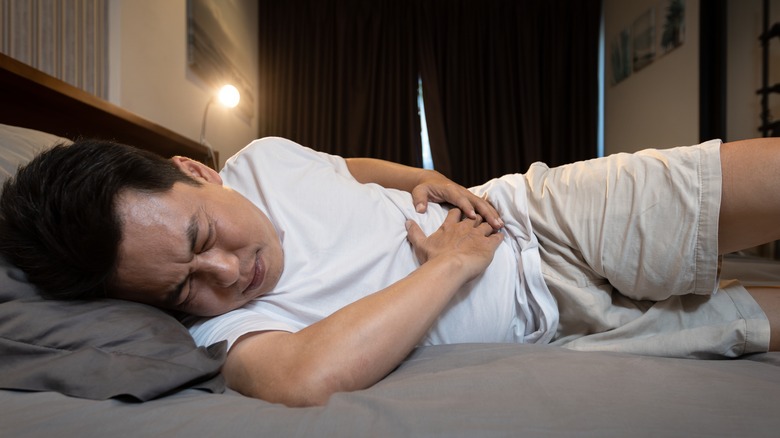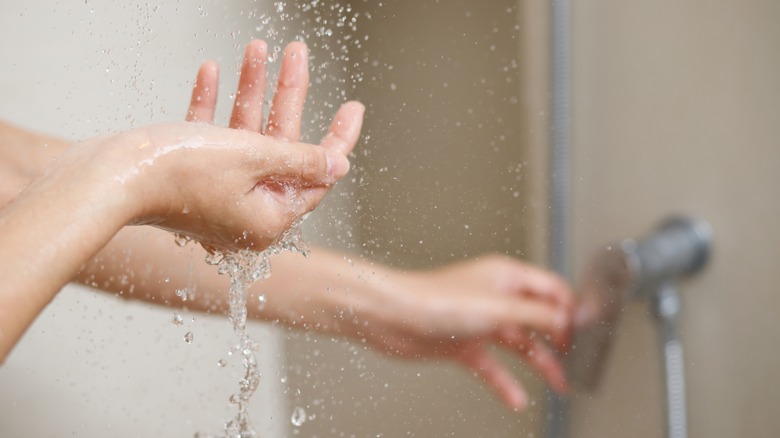Do This To Pass A Kidney Stone Quickly (And Help Manage The Pain)
Chances are you or someone you know has had a kidney stone. You might not know you have a kidney stone if it's small enough because it might not cause any symptoms. Some people might carry their kidney stones for several years with no symptoms at all.
You're more likely to experience symptoms of a kidney stone when it's trying to pass. Larger kidney stones might cause pain on one side of your lower back or just overall pain in your abdomen. This pain might become more severe if the stone causes blockage or irritation while it moves through your urinary system. You might also see blood in your urine or feel flu-like symptoms such as fever or nausea. Pain while urinating is also a symptom that a kidney stone is trying to pass.
Unfortunately, a kidney stone won't pass overnight. According to Baptist Health, larger kidney stones can take more than a month to pass. In the meantime, you can take acetaminophen or non-steroidal anti-inflammatory drugs (NSAIDs) to help manage your pain. To help the stone move a little more quickly through your system, drink plenty of fluids such as water, citrus juice, or apple cider vinegar. However, this might not work for everyone.
Other methods to help pass a kidney stone
Urologist Dr.Scott G. Hubosky at Jefferson Health cautions against older adults drinking too much fluids, especially if they have congestive heart failure. Drinking excess water can cause a dangerous drop in your sodium levels. If you're in severe pain, he suggests consulting a urologist to see the size of the kidney stone and determine whether it will pass without complications. Some kidney stones might require medication or non-invasive procedures to help them pass.
The Urology Group advocates physical activity for helping to pass a kidney stone more quickly. If you're still in a lot of pain even after taking pain relievers, try taking a hot bath or shower. You might also find relief with a heating pad. If the pain is still severe or you begin vomiting, you might need a trip to the emergency room to provide proper care. Alternative remedies such as herbal supplements might also work to help you pass a kidney stone, but they should supplement rather than replace medical care.
Preventing kidney stones
Just like drinking water might help you pass a kidney stone, keeping your body properly hydrated can help prevent kidney stones. Dehydration makes your urine more concentrated so that minerals form crystals in your kidneys. Most people should make water their fluid of choice, but your doctor can be your best guide in determining how much water is best based on your current health.
Fruits and vegetables might have more acid in them, but they make your urine less acidic. Animal protein increases your risk of kidney stones because these foods produce more acid in your digestive and urinary systems. Foods that are high in purines encourage uric acid kidney stones, so avoid foods like organ meats, bacon, sardines, and anchovies. Alcohol is not only dehydrating but also has purines.
If you have too much sodium in your diet, you could run the risk of calcium oxalate kidney stones, which are the most common type of kidney stones. Sodium causes you to leak calcium, which can form a kidney stone. You don't want to limit your calcium intake, though. You'll still want to consume at least 1,000 milligrams of calcium a day, especially when you eat foods high in oxalates. Oxalates bind with calcium in your digestive system so the calcium doesn't leak into your urine. Foods high in oxalates include peanuts, rhubarb, spinach, and chocolate.



